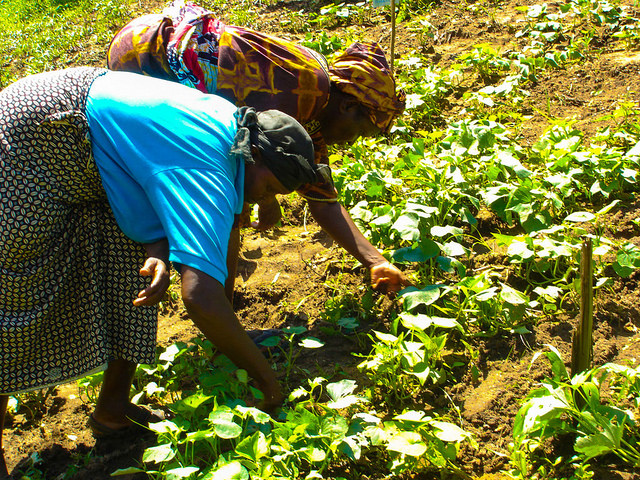The United Nations declared 2014 the International Year of Family Farming to highlight the important global role family and smallholder farmers have in eradicating hunger and poverty, providing food security and nutrition, improving livelihoods, achieving sustainable development, and building resilience, especially in rural areas.
A key aspect of IFPRI’s research on the challenges faced by family and smallholder farmers, who make up the majority of the world’s poor, is the development of effective strategies for building resilience:
- Climate change: According to a recent essay by IFPRI Director General Shenggen Fan, small-scale farmers represent one of the most vulnerable groups when it comes to dealing with the effects of global climate change. In Ethiopia, for example, where nearly all small farms depend on rain for irrigation, drought or irregular rainfall can have a devastating impact on harvests and farming families’ well-being. Fortunately, innovative insurance schemes have been shown to help family farmers cope with drought and other weather-related shocks. IFPRI’s recent research on index-weather insurance in Ethiopia found that weather-related insurance schemes can help farmers adapt to and build resilience against changing weather conditions.
- Food price volatility: Another significant challenge smallholder farmers face is high and increasingly volatile agricultural commodity prices at the local, regional, and global levels. Rapidly changing prices make it difficult for farmers to decide which crops to plant in order to sell them at a profit at harvest time. IFPRI’s Food Security Portal, an open access repository of policy information, provides comprehensive and detailed information on food policy developments, including global commodity prices. Its Excessive Food Price Variability Early Warning System shows past periods of excessive global price volatility dating from 2000, as well as a daily status of price volatility. In response to a hike in onion prices in South Asia in 2013, IFPRI collaborated with the Bangladesh Policy Research and Strategy Support Program (BRSSP) to launch Sudden Onion Price Surge in Bangladesh: A Situation Analysis for Policy which offers perspectives on the rising onion prices and provides a set of policy recommendations that help smallholder farmers cope with price volatility in the short, medium, and long term.
- Women’s land ownership: In Africa, women contribute significantly to food production, but do not necessarily own the land. Ensuring women’s land rights can positively influence food security, gender equality, environmental sustainability, and economic development. IFPRI’s Gender, Agriculture, and Assets Project (GAAP) aims to better understand the impact agricultural development projects have on women’s (and men’s) access to, control over, and ownership of land and other assets. IFPRI research results have shown that land rights for women are crucial to reducing household poverty and vulnerability, adopting more sustainable farming techniques, and improving women’s bargaining power within the household. Additionally, households in which women have greater control over assets—including land—often have higher rates of calorie availability and dietary diversity.
- Access to markets: Working with the Asian Development Bank (ADB), IFPRI researchers found that improving and modernizing food value chains have allowed Asian farmers to link directly to markets, thus increasing small-scale farmers’ profits and providing urban consumers with steadier, and less costly, food supplies. IFPRI also assesses value chain projects in countries where women are generally less likely to be involved in formal market activities. A recent study in Bangladesh showed that the Strengthening the Dairy Value Chain Project (SDVCP) had positive impacts on shifting gender norms regarding household decisionmaking.
- As IFPRI’s latest Food Policy Report, From Subsistence to Profit: Transforming Smallholder Farms, points out, while there is no silver bullet to help family farmers across different continents and contexts, smallholder-friendly policies and investment environments can help smallholder farmers with profit potential undertake more commercial activities and open doors for those searching for off-farm employment opportunities.







